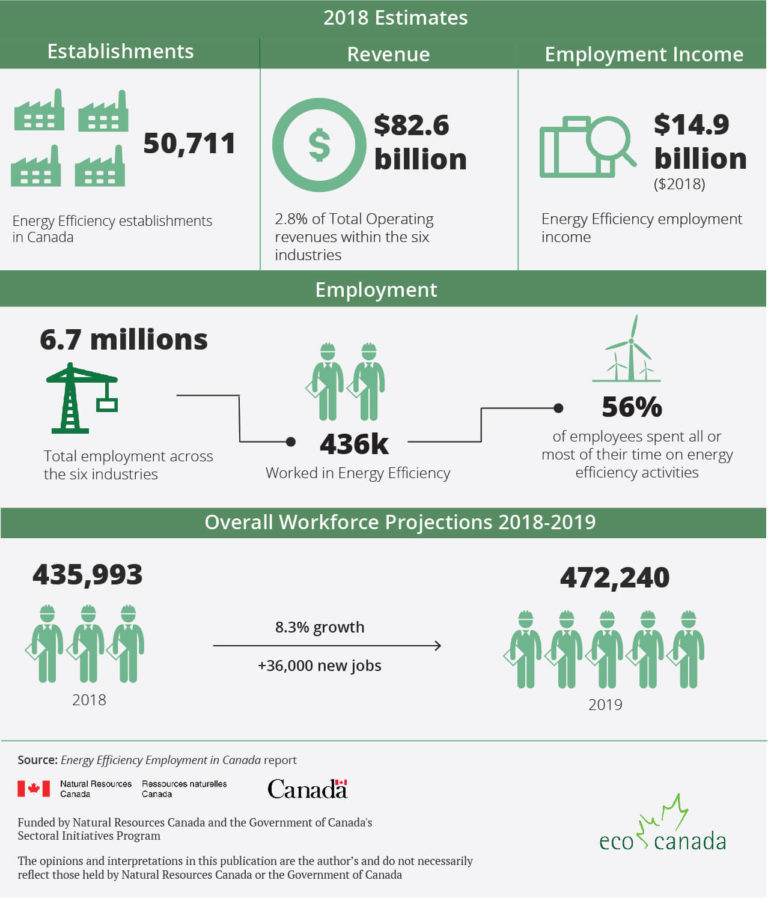
About This Job
Energy Management is a very diverse field that aims to optimize the supply and demand of energy in an organization with a bigger focus on the demand side where energy is used. An energy management professional can specialize in a variety of areas including technical analysis and design, engagement and strategy, project management, financial analysis, or policy development, but more commonly would be involved in a mix of all of them.
The field is constantly growing and fits in all sectors of society such as industrial, commercial, institutional, residential, and transportation, with the ultimate goal of providing energy services as efficiently as possible while supporting the business functions of an organization.
Common job titles for an energy professional include Energy Manager, Energy Specialist, Energy Analyst, Energy Engineer, Energy Consultant, Planner, Designer, and Technologist.

This infographic summarizes the vast opportunities in energy efficiency employment in Canada.
A Career in Energy Management
Other Resources: How to Break Into the Renewable Energy Industry (podcast)
Key Duties
- Developing and implementing Strategic Energy Management Plans for a facility or an organization
- Conducting energy audits for energy systems in a facility to understand where energy is used and recommending energy conservation measures
- Monitoring energy consumption, setting energy targets, and reporting on performance to different stakeholders such as government, senior management and operators
- Measurement and verification of energy consumption for implemented projects
- Greenhouse gas emissions accounting and climate action planning
- Technical analysis of energy consumption and costs
- Stakeholder engagement and communication
- Project management
- Business case development
- Technology development: researching and evaluating new technologies
Critical Skills
- Communication and Stakeholder Engagement
- Strategic Planning and Analytical Skills
- Business Case Development
- Knowledge of Mechanical and Electrical Energy Systems (e.g., lighting, boilers, and HVAC)
- Project Management
- Energy Calculations and Utility Rates
- Greenhouse Gas Emissions Accounting
- Leading Others
- Strong Writing Skills
Work Environment
- Office environment
- Constant engagement with internal staff from other departments such as facilities, operations, or senior management as well as external staff like consultants and contractors
- Depending on the role, may involve visiting facilities and auditing energy systems
Professional Certifications/Licenses
- Certified Energy Manager (CEM)
- Certified Measurement and Verification Professional (CMVP)
- Certified Change Management Practitioner (CCMP)
- Leadership of Energy and Environmental Design (LEED)
- Green Associate (GA),
- Accredited Professional (AP), various sub-specializations
- Business Energy Professional (BEP)
- Energy Efficiency Practitioner (EEP)
- Certified Energy Auditor (CEA)
“The energy efficiency sector employed 436,000 workers across 6 key industries in 2018 – that’s about 2.3% of all jobs in Canada. For comparative purposes, 204,000 people are employed in mining, quarrying and oil and gas extraction, and 123,000 are employed in telecommunications.”
– Efficiency Canada
In the global effort to combat climate change as the most critical global challenge, climate projections and modeling show that energy management is as important as renewable energy in our efforts to achieve the recommended climate change mitigation targets.

Source: World Energy Outlook 2019
Job Search Tips - Where to Focus Your Time
- Meet with a YU Career Services Advisor
- Volunteer to gain experience and build your network
- Learn about industry contacts and topics via free newsletters, subscriptions, and publications
- Find a mentor
- Join a professional association, find your local chapter, and learn about membership benefits
- Join LinkedIn groups and search for group members
- Aspiring entrepreneurs can join a business networking group
- Search for industry events
Learn about essential skills for job seekers, labour market information, employment trends, and salary data
Build a Strong Resume:
- Tips for Energy Manager Resumes
- Must-Have Skills and Keywords
- Sample Sections for Experienced Professionals, Entry Level Resume
Create a LinkedIn Profile:
Energy Management (and Other) Job Portals:
The average salary for a Canadian energy management professional can vary based on experience level and the industry. Starting annual salaries can be around $55,000, but a Certified Energy Manager with a few years of experience can earn an annual salary of $80,000 to >$100,000.
